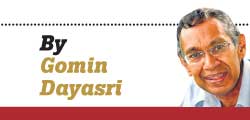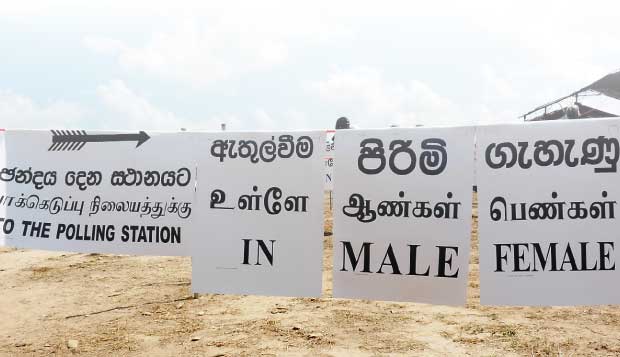Realistically futuristic in 2020
Posted on December 20th, 2017
By Gomin Dayasri Courtesy The Daily Mirror
Elections can’t be held for another 24 months-till 2020- due to the stupidity evolved by the‘pundits’ on the 19th amendment. Manipulations have placed the UNP in serious trouble. If local Government elections aren’t held in early 2018 – the UNP will lose more votes- for not keeping to the scheduled scorebook. Reasons are too numerous to be indicated in an article of 1000 words at the editor’s request, thankfully ignored permanently by him and me.

- Many know a new Government with a new Prime Minister may be in the making
- Too late to wait till 2020 for a comeback
- Mahinda Rajapaksa had a golden opportunity after successfully winning the war
- Blame can be laid on the eerie silence on a matter critical to the Government in power
- The right to criticize judicial error that is internationally observed is no longer deemed sacrosanct
- Judges have a duty to exercise their functions within their jurisdiction
Too late to wait till 2020 for a comeback…sitting MP’s from the UNP/SLFP/JO/ will lose their seats; that may not endear them to the party leadership of the parties they represent.
UNP digs its grave
End of a coalition:SLFP/ UNP/JO MPs will cross parties to search for a final resting home by not giving a hearing to the selfish pleadings of President Maithripala Sirisena, imploring them to stay with him, goes unheeded. Many know a new Government with a new Prime Minister (PM) may be in the making without holding elections; with a prohibition of 4 and ½ years imposed on holding fresh elections since the last by a Supreme Court at a flawed moment.

With varied elections (1) general (2) presidential (3) provincial and (4) local government lumped within a 24 to 30 months time frame caused by a vague amalgamation of the 13th and 19th amendments by unkempt minds –makes the democratic process imprudent and gives rise to thoughts of jettisoning the two broken legs in our constitution. Serves them right.
Mahinda Rajapaksa (MR) had a golden opportunity after successfully winning the war, to amend 13th to look innocuous by weeding out the poisonous content; instead his subordinates were engaged in unlicensed skullduggery without indulging in proper governance. Puts him out of reckoning: Ranil Wickremesinghe can revive him.Usually vocal Westerners fail to make the needed noise that makes Wickremesinghe look their pet poodle. However no political party will dislodge the Provincial Council system with the JVP acknowledging it, housing its tired politician’s kith and kin to represent the next generation of politics.
Misery is extending beyond our lifetimes
Remember the 19th amendment that was challenged in the case of Dayasri vs AG –with counsel playing the role of the petitioner, addressed the Supreme Court, leaning heavily on the unconstitutionality of taking away the peoples right to vote at General Elections on artificially imposed time frames or the refusal to hold elections for 4 ½ years. Ironically these submissions were re-echoed by several other counsels, but weren’t considered or accepted/rejected by the bench of three judges. All are made helpless today.
As a counsel having won and lost many cases, yet never before or after was the prime submission so readily un-reckoned that seriously affects the people and the country and the democratic process on a major lapse caused by the apex court. Blame can be laid on the eerie silence on a matter critical to the Government in power. Where are the great constitutionalists of the West and the mighty warriors on human rights on this issue? Gone fishing.
Consequences of denying the people the right to exercise the vote at a General Election for a period of 54 months or declining to hold fresh elections, once the Government loses its majority or rules outside the period democracy has mandated or Government gets defeated on a sensitive financial bill such as the Budget to extract money to govern or on a vote of no confidence that defeats a Government in office, leaves the people in a quandary. Enables a crooked Government to make a few cosmetic changes and remain in office with the same crew disarranged.
At least, we now have a Supreme Court to be proud of, where the Chief Justice (whom I criticized previously when he acted meekly and laud him and the rest of the Bench for the service rendered at present) is not afraid to call a spade by its proper name. Why? The right to criticize judicial error that is internationally observed is no longer deemed sacrosanct and has reached our shoreline and has been practiced by bold counsel without cutting the edges of contempt that must be safeguarded to make judges act fearlessly and independently; while gently reminding them none are above the law. The character of Sri Lanka has been enhanced with the ladies and gentlemen that grace and glorify the higher judiciary and the appellate courts having exercised its powers in an upright manner. No more need be asked or expected as we await the decision in one of the most sensitive cases in our lifetime relating to the Bond Commission.
Judges have a duty to exercise their functions within their jurisdiction and can’t exceed the limits to please many and defy the frontiers of jurisdiction. Otherwise it can be challenged in courts successfully with their defense in the hands of the Attorney General.
A moment to savor is when three great judges Wimalaratne, Vythialingam and Colin-Thome fearlessly struck down on grounds of natural justice the findings of the Special Presidential Commission of Inquiry by no lesser men than Sharvananda, Weeraratne and De Alwis holding Sirimavo Bandaranaike guilty of wrongful misconduct; that required then President Jayewardane to restore the status quo by way of a passage via a parliamentary resolution that was sharply criticized by the Federal Party led by Amirthalingam and the CWC of late S Thondaman. Such were times of which much is forgotten.
The story does not end there. J.R Jayewardene voluntarily pardoned ‘Mrs JVP Bandaranaike’, previously denied her the right to contest him in 1982 [substitute was Hector Kobbekaduwa]. UNP’s candidate at the next presidential election was R.Premadasa, not in the good books of JRJ, won the election with help of the JVP’s protest campaign; Premadasa was a better President than the old fox JRJ. He was gunned down by the LTTE.
Bandaranaike died much later after serving another term as PM in extreme age after holding office of PM at the time she was docile. Sri Lankans never grudged it; as she was a leader who loved the country and never betrayed the trust.
December 20th, 2017 at 5:19 pm
Another great analysis by Gomin.
Parliamentary elections cannot be held until February 2020 but presidential elections must be held by December 2019. Sirisena seems to be a dilemma – whether to go after Gotabaya or Basil. It all depends on who will contest in 2019. As Basil is now leading, Gotabaya is set free. By 2019, Sirisena and Rajapaksas will be playing a game of brinkmanship.
UNP voters are less likely to abstain from voting than the other camp. Minority voters will make it a point to vote (they always do). UNP Sinhala voters are some of the most dedicated and attached.
JVP decision will be crucial. If Rajapaksas are powerful, JVP will contest alone to divide the Opposition vote. If they are weak, JVP will support Sirisena.
Sirisena government will make maximum use of 13A to hold provincial council elections strategically (Mahinda tried it too but failed) to drive out SLPP (as it has no minority votes). Mahinda mentioned he will retire after LG elections. I doubt it very much.
December 20th, 2017 at 8:03 pm
Most Lankaweb commentators and even dictators cannot think with a free brain.
2010 prez election shall be taken as the base, always.
It is the highest point of popularity time of MR.
UNP + Tamils + Muslims ( if we combine the worse case) got 40% votes. This means lowest possible pecentage for UNP is about 35%.
Now go to 2015 general elections. UNP ( alone) attracted 10% more.
Now my question is will this 10% vote for MR in 2020 ? NEVER ! They were fed up with him in 2014. What did he do to GET THAT FRUSTRATION OUT ? NOTHING !
Big Central Bank Robbery took place beofre the elctions and well known by then. But that 10% simply couldn’t vote SLFP to power, knowing that MR would sneek in.
Now BR is running election, so was in 2015
They they say they did everthing right up to 2015
If that 10% want to vote someone else, they will choose various parties not BR, NR and other well known faces.
Regardless of any other issues, MR must do something to get back that 10%.
Lankaweb MR lovers must encourage him to do so, rather than replaying whatever rubbish they publish.
Dont’ try to supress that 10%, it is Gold. Listen to them, strictly implement what they ask !
December 21st, 2017 at 4:56 am
The lowest UNP won at a presidential election was around 35% (1994). However, that excluded the north.
Like it or not, winning JVP support goes a long way to get part of that (floating voters’ percentage is around 17% but don’t assume all floating voters vote for one party). However, the bigger concern for SLPP in 2019 is the fragmentation of the patriotic vote base. Not all patriots are dumb clan worshipers; there are wise patriots as well. They will not blindly support a party. They will make tough demands. Otherwise they will field their own candidate.
In 1980s when it was introduced, the 50,000 deposit was a huge amount of money. Not anymore. Getting media attention was also very difficult and expensive back then. Not anymore.
After a long time, India, Nepal and Pakistan dumped clan politics to a great extent (not fully though). Only politically backward Bangladesh and Sri Lanka hold on to it so much. North Korea is an extreme example.
December 22nd, 2017 at 5:58 am
Ranil Wickremasinghe, the mutt, got the provision that the elections could not be held for four and a half years simply to avoid a repetition of what happened to him in 2003.
Those who helped him in that process are worst idiots including JO.
Ranil Wickremasinghe goes in to world history as the champion of democracy who prohibited holding elections by the constitution itself.